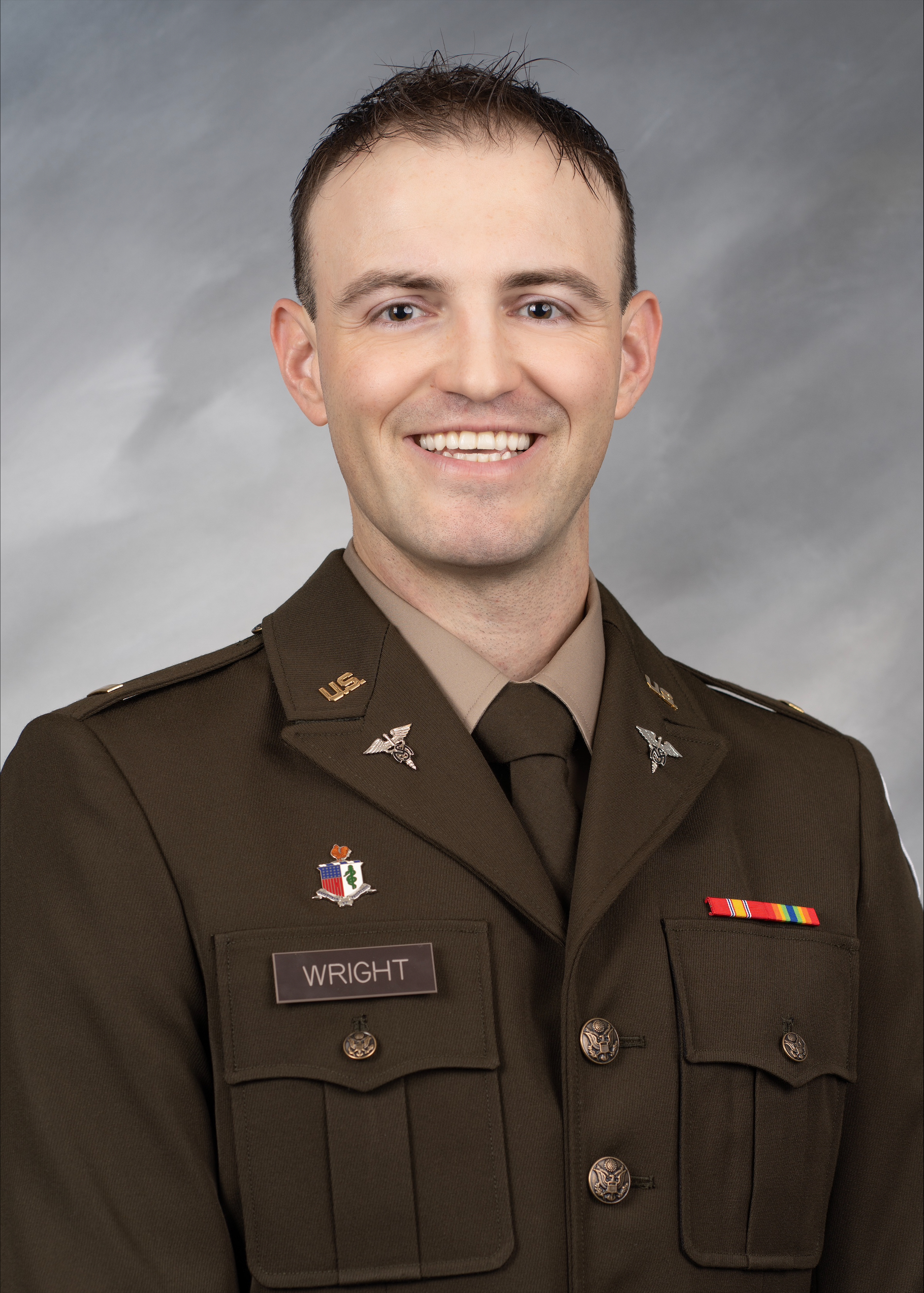Feature Student March 2024
 Benjamin Wright
Benjamin Wright
Introduction
Benjamin Wright is a fourth-year military medical student at Wayne State University. Benjamin’s journey has been deeply intertwined with the military community, as his father served in the Army for 23 years. Growing up in this environment, Benjamin developed a strong desire to serve as a physician within this very community. Upon graduation, he will be commissioned into active-duty status and will embark on his residency training in emergency medicine at Madigan Army Medical Center in Tacoma, Washington.
Inspiration Behind Leading the Military Trauma Course
Benjamin’s passion for teaching and sharing knowledge led him to take on a significant role—the leadership of the military trauma course. But what inspired him to step into this position? During a break between his first and second years, Benjamin embarked on a transformative experience. He traveled to Fort Carson, Colorado, where he immersed himself in training alongside military combat medics for an entire month. This intensive training included courses in basic Tactical Combat Casualty Care (TCCC) and Advanced Trauma Life Support (ATLS). Under the expert guidance of medics, emergency medicine physicians, and trauma surgeons, Benjamin gained invaluable hands-on experience. Eager to pass on this wealth of knowledge, he decided to bring these critical skills back to Wayne State and share them with fellow students.

Innovative Teaching Strategies
Benjamin Wright, our featured student teacher, brings a fresh perspective to the classroom through his innovative teaching methods. Benjamin’s teaching philosophy is all about engagement and practical application.
Problem-Based Learning in Action:
Benjamin believes in promoting an engaging and dynamic learning environment. To achieve this, he introduces problem-based learning cases during physical activities. For instance, in one scenario, he challenges students to envision how a tactically trained medical professional should approach an injured combatant while under direct fire. The classroom transforms—desks become makeshift barriers, and a mannequin represents the wounded soldier. Benjamin poses the critical question: “How do we reach this soldier to begin treatment?” By allowing students to brainstorm ideas and actively engage, he fosters critical thinking and teamwork. Only after their creative input does he provide clues to guide them toward effective solutions.
Hands-On Competitions for Mastery:
Benjamin adapts his teaching to resonate with all students. Concepts that intrigue him may not necessarily captivate others, especially those not drawn to trauma care or military medicine. However, he discovered a universal truth: almost all students thrive on hands-on activities, especially when combined with healthy competition. After teaching students the proper way to apply a tourniquet, Benjamin organized a spirited race. Teams of students competed in Mazurek, racing to place a tourniquet on a “downed” teammate. This interactive approach not only increased their focus but also fueled their desire to master essential techniques.

Walkthrough of a Military Trauma Course Session
Benjamin Wright orchestrates sessions that prepare future healthcare providers for the challenges they may face in the field. A typical session includes the following features:
Structured Approach to Primary Assessment:
Benjamin guides students through each step of the primary assessment. This includes both the Advanced Trauma Life Support (ATLS) approach (ABCDEs) and the Tactical Combat Casualty Care (TCCC) approach (MARCH). The first session serves as a foundation, covering the basics of primary assessment and highlighting the differences between ATLS and TCCC.
The session kicks off with an initial introduction to tourniquets—a critical skill in trauma management. But Benjamin doesn’t stop there; he infuses an element of fun by organizing tourniquet drills, fostering healthy competition among students.
Continuity and Hands-On Skills:
Subsequent sessions build upon the foundation laid in the initial class. Benjamin ensures continuity by starting each session with a quick review of the previous material. Then, he dives into the next segment of primary assessment, emphasizing hands-on skills.
Students engage in practical exercises related to airway intubation, needle decompression, thoracostomy, and other essential trauma interventions. Benjamin’s goal is to equip them with the skills needed to provide effective prehospital care.
Bridging the Gap: Medics and Trauma-Focused Physicians:
Benjamin’s overarching mission is to bridge the gap between the knowledge and skills required by medics and those needed by trauma-focused physicians. Understanding prehospital care—what happens before a patient arrives in the trauma bay—is crucial for delivering high-quality care. By emphasizing this connection, Benjamin prepares students to seamlessly transition from the field to the hospital setting.

Memorable Teaching Moments: Instilling Confidence
As a student teacher, Benjamin finds immense fulfillment in witnessing his students’ growth. One of the most rewarding moments occurs when students, who had never seen a tourniquet applied before the session, gain confidence in their ability to perform this critical procedure during a trauma code. Their excitement and newfound competence serve as a testament to Benjamin’s effective teaching approach.
Words of Wisdom
“Teaching may seem daunting at first. Initially, I wasn’t interested in teaching for fear of my own gaps in knowledge. However, I wanted to share my knowledge with others to pass along confidence to them. In developing this course, I found that I actually loved to teach and instill confidence in students to provide medical care to others in a time of need. I would encourage others to give teaching a chance if it piques their interest.
While teaching is rewarding, I also learned that it can be difficult because it requires mastery of the materials. It required me to study the information to speak confidently, ensure all supplies and logistics are arranged, and prepare to answer potential questions I am asked. Preparation is key. Overall, teaching is a rewarding process that will push you to enhance your own learning and become a better physician.”